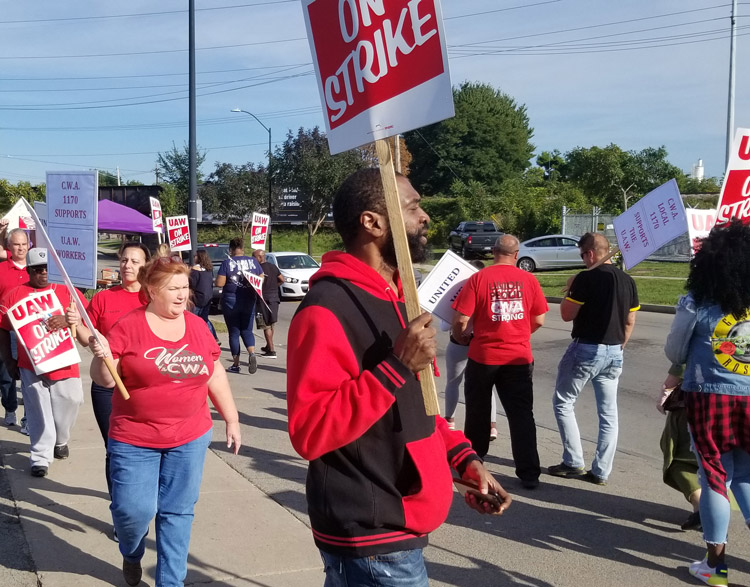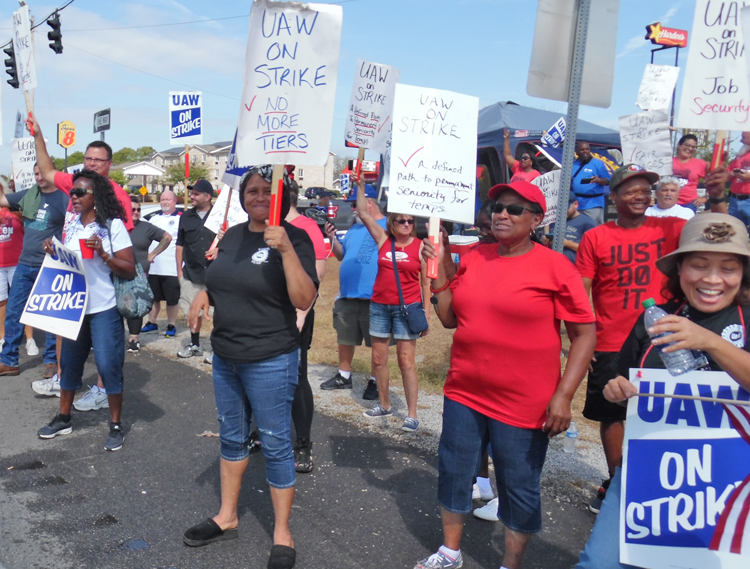ROANOKE, Ind. — “I’ve been a temporary worker for three and a half years with no end in sight,” United Auto Workers union member Raymond Walker told the Militant on the General Motors strike picket line here as he joined some 40 UAW members Sept. 22. This was one of seven picket lines kept up 24/7 around the Fort Wayne GM assembly plant. Over 4,000 members of UAW Local 2209 work here.
Almost 50,000 UAW members have been on strike at 33 GM factories and 22 parts warehouses across the country since Sept. 16. It’s the longest GM strike since 1970.
The most popular T-shirt worn by strikers and the most common chant on the picket line was, “No more tiers.” This is the central issue — the division between temps, long-time GM workers, and those who have been hired since the bosses declared bankruptcy in 2009.
“I make $19 per hour doing the same job on the assembly line as my co-worker, who is a regular GM employee making $29 to $32 per hour,” Walker said. “That’s why we’re on strike. It’s not fair.”
Robin Nolley, who has 24 years on the GM assembly line, was picketing next to Walker. “There is also a tier system even if you’re a regular employee of GM,” she said. “It takes eight years to reach top pay even though you’re all doing the same job. All this causes divisions in the workforce.”
Kim Evans started out as a temp worker, but is now a regular GM employee. “I know one worker who has been a temp for five years,” she said. “Not only do they get paid less, their health care insurance is inferior and they get no vacation, no eye care or dental insurance. They get all of three unpaid days off per year!”
“All temps should be made permanent and no more temp workers in the future,” striker Ester Clay said. “That’s what we’re all fighting for.”
Many of the workers here used to work at other GM plants that the company closed to shore up profits. They were given the option of transferring to the Roanoke plant. “We are a workforce of exiles,” is how one striker put it.
This is another key issue in the strike. In the last year, GM bosses have closed three big plants — in Baltimore; Lordstown, Ohio; and in Warren, Michigan — and announced they will close the plant in Hamtramck, Michigan, in January. The union is demanding the bosses assign new production at these plants and bring the workers back.
The strike is having a ripple effect on other plants that supply parts to the company. Some 1,400 workers at GM’s St. Catharines Propulsion Plant and its Oshawa Assembly plant in Ontario have been laid off.
GM also told the 525 workers at the DMax Ltd. Plant in Moraine, Ohio, that there isn’t any more work as long as the strike goes on.
Widespread solidarity
The strike has been met with growing support among working people, with other workers volunteering to join in picketing and bringing supplies, food and other donations to the strikers.
“The Teamsters brought their big rig to the line,” Dan Maloney, president of 750-member UAW Local 1097 in Rochester, New York, told the Militant Sept. 18. Strikers’ spirits were high and the union hall was a buzz of activity. “We’ve also been visited by and received donations from dozens of unions. They see that if we lose today, it will be them tomorrow.”

The first “Solidarity Sunday” was held Sept. 22, where the UAW asked people to come out and show support. Picket lines across the country swelled.
Workers from the nearby 7,000-member Ford Claycomo plant, other autoworkers, strikers’ relatives and neighbors turned out to picket and show solidarity with UAW Local 31 members at GM’s Fairfax assembly plant in Kansas City, Kansas.
One Teamster told the Militant they were refusing to haul any GM cars. Teamsters Joint Council 56 and Local 41 are conducting a food drive for strikers.
“The picket shifts are four hours a week, but lots of local members are coming down at all different times to make sure the line is strong,” said Chet Hale, a 31-year veteran at GM and a picket captain at GM’s plant in Spring Hill, Tennessee.
A serious class battle
GM bosses’ efforts to push back against the strike are serious. They admit they’ve been raking in big profits since their carefully planned bankruptcy and generous government bailout. But they say they still need to wring more concessions out of workers to prepare for rough competition ahead.
The auto bosses are plowing capital into development of electric vehicles and driverless cars. They intend to make the workers pay for the transition. They say everyone needs to sacrifice to save the environment.
Workers know this will cost jobs. Electric cars mean the elimination of internal combustion engines, replaced with an electric powertrain with far fewer parts. The Chevy Bolt powertrain today, for instance, has 80% fewer moving parts than a regular GM car.
Ford Motors announced they are now running live tests of driverless cars in Washington, D.C., and Miami, and will begin doing so in Austin, Texas, in November. The UAW extended its contracts with Ford and Fiat Chrysler, intending to press them for new contracts after settling with GM.
The bosses are also getting help against the workers from the government and its political police. Just before the strike began, FBI and federal prosecutors carried out raids at union offices. They’ve brought charges against a number of union officials, charging them with corruption.
The pro-boss press makes the absurd charge that the union officers called the strike to divert workers’ attention from the charges. In a Sept. 17 opinion piece entitled “Behind the Auto Workers Strike,” Wall Street Journal editors claim, “UAW leaders are honking their horns to distract members from a federal corruption probe.”
But, as strikers tell anyone who asks, they’re on the picket lines to protect their jobs and to end the divisive tier and temp system imposed by GM. They’re winning widespread support from other workers, who are inspired by someone fighting back against the attacks of the bosses, who seek to force the working class to pay for the ongoing crisis of the capitalist system.
Any problems inside the union are the workers’ business. Against the bosses, they stand united.
GM workers need solidarity from other workers in this strike. Sandra Ellis, who has worked at the Bowling Green, Kentucky, GM Corvette plant for 32 years, told Militant worker-correspondents who joined the line there Sept. 23 to ask its readers to “send your well-wishes, walk the line with us.”
Jacob Perasso in Albany, New York; Jim Kendrick in Kansas City, Missouri; Jacquie Henderson in Louisville, Kentucky; and Susan LaMont in Atlanta contributed to this article.


